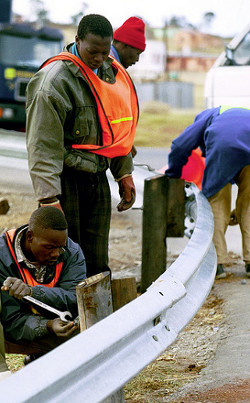Richard Batley is emeritus professor and Claire Mcloughlin a research fellow at IDD. They have worked on questions of service delivery, including the preparation of a Handbook on Contracting Out Government Functions and Services in Post-Conflict and Fragile Situations. The Handbook is a product of the OECD’s Partnership for Democratic Governance which was set up in 2007 to examine how core policy functions could be strengthened in fragile states or those recovering from conflict.
Governments of fragile states need to deliver services, ensure security and maintain legitimacy in the most difficult circumstances. Populations may be displaced, infrastructure absent or impaired, the rule of law minimal, and government’s own capacity weak. Donors, international NGOs and local informal service providers are often the first to intervene to satisfy basic demands, frequently bypassing government.
This presents deep dilemmas. The OECD has identified the building of ‘effective, legitimate and resilient states’ as the central objective of international engagement in fragile situations. As far as possible, states would therefore provide their own core functions and essential services to the population. Others argue that getting services to the population is more important than who provides them. Is there a compromise solution where government contracts private providers and NGOs to manage functions and services on its behalf, or does this further postpone the development of state capacity? Is contracting out more than just a way out of difficult choices, and in fact a positive way of combining state and market roles?
We don’t take an ideological stance for or against the contracting of non-state service providers, but rather a pragmatic one: in fragile situations, at least in the short term, there is unlikely to be sufficient capacity within the public sector for delivering the bulk of essential services and functions. Governments have to decide whether, what and how they can contract out to external providers. They may prefer to provide their own services and functions but contracting out accepts the need for external providers while putting government in the driving seat – setting the policy framework and coordinating provision.
The OECD Partnership for Democratic Governance (PDG) is producing a short documentary film to accompany the Handbook on Contracting Out Government Functions and Services in Post-Conflict and Fragile Situations. This trailer provides a preview of one of the three country cases to be presented in the documentary.
Almost everything that is done by government could be contracted out to the private sector or other non-governmental organizations. However, for good reason, there is greatest reluctance where the function defines a state’s sovereignty (such as diplomacy, security and defence) or affects policies that are at the heart of the political process. Even here, advice and support may be contracted – for example to train the military or to advise on budget design. Governments may also closely guard aspects of their core internal administration, such as financial management and legal services. However, temporary support for public procurement, customs, tax collection, accounting and auditing has been contracted, for example, in Afghanistan, Angola, Liberia, Mozambique, and Southern Sudan.
 Photo credit: Trevor Samson / World Bank
Photo credit: Trevor Samson / World Bank
Qunu, Eastern Cape, South Africa. Workers repairing a barrier on the road. South Africa.
The sphere that raises fewest doubts is the delivery of functions and services to citizens. This intrudes least into the state’s own internal administration and offers the greatest opportunity for exploiting competition between rival contractors. There are widespread examples of the contracting out of health care and other social services, infrastructure (roads, water and sanitation, telecommunications), agricultural extension, and some aspects of security services (maintenance of police stations, prisons and court houses). Liberia, the Democratic Republic of Congo, Afghanistan, Southern Sudan, Rwanda and Gaza are just a few examples.
There are no standard blueprints for contracting; government policy-makers and field practitioners have to weigh up the pros and cons of contracting out and navigate the processes of procurement and implementation once the decision is taken. A key prerequisite for successful contracting in fragile states is the development of governments’ capacity to assess the options and to manage them, whether the ultimate intention is to continue contracting out or eventually to provide services directly.
The Handbook on Contracting Out Government Functions and Services in Post-Conflict and Fragile Situations was published in September 2010.
For more about this subject, see the following materials from the Organisation for Economic Cooperation and Development (OECD):

